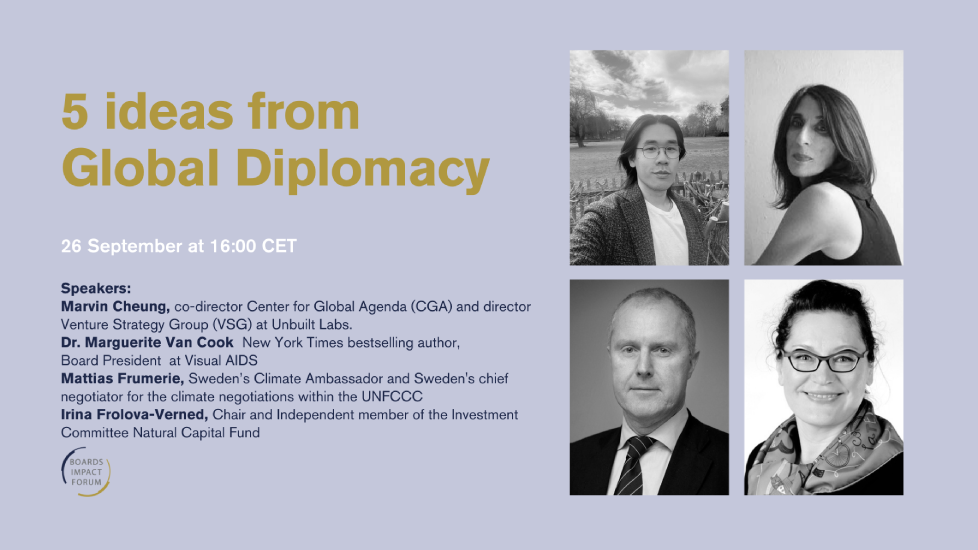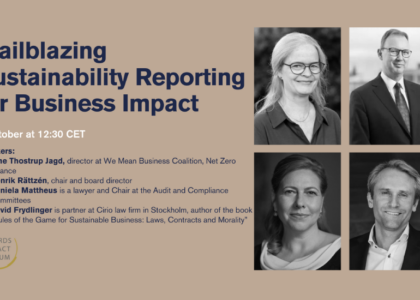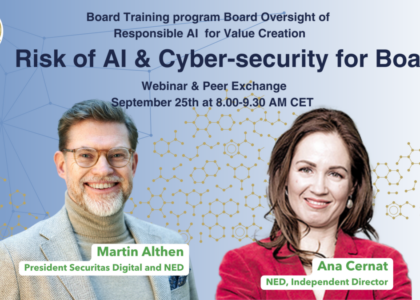On Thursday, September 26, 2024, from 16:00 to 17:30 CET, Boards Impact Forum hosted a webinar and peer exchange event titled “5 Ideas from Global Diplomacy for Board Members.” This session, brought together:
Speakers and Panelists:
• Marvin Cheung, business executive and global governance scholar, Center for Global Agenda (CGA), co-director at the Venture Strategy Group (VSG) and director at Unbuilt Labs
• Dr. Marguerite Van Cook, Board President (Non-Executive Chair) at Visual AIDS and Adjunct Professor at Columbia University and the Fashion Institute of Technology (FIT), New York
• Mattias Frumerie, Sweden’s Climate Ambassador and Sweden’s chief negotiator for the climate negotiations within the UNFCCC
• Irina Frolova-Verned, Independent Chair Investment Committee Natural Capital Fund at Climate Asset Management, NED and Chair Audit Committee Stockholm Exergi (Sweden) and HZPC (Netherlands).
The event was moderated by Liselotte Engstam, NED and Chair of Boards Impact Forum.
Table of Contents
The Diplomatic Approach to Sustainable Development
Marvin Cheung, a business executive and global governance scholar, opened the session by discussing his latest book, Five Ideas from Global Diplomacy, which offers lessons for boards seeking to navigate the complexities of sustainable development. He emphasized that while we often acknowledge the need for systemic change, organizations and boards must consider how much change they are personally prepared for.
He also highlighted that traditional goal-oriented approaches to sustainability, such as those seen in the SDGs, often lack clear pathways to success. Instead, Cheung advocates for a method-oriented approach, focusing on facilitating social progress through macro and micro-interactions. He stressed that focused social interactions and sustained engagements are critical for driving transformation, particularly when dealing with complex issues like climate action.
Practical Implementation of Diplomatic Principles
Dr. Marguerite Van Cook, Board President at Visual AIDS and Adjunct Professor at Columbia University provided practical examples of how the ideas from Marvin Cheung’s book can be implemented at the board level. Dr. Van Cook shared her insights on initiatives like social impact measurement through health outcomes and small research grants to engage stakeholders and foster collaboration.
Dr. Van Cook emphasized the value of transdisciplinary engagement, involving stakeholders from diverse fields such as the arts, to create a broader impact. She shared examples from her own experience at Visual AIDS, where small grants led to significant outcomes, including increased public awareness and board diversity. Dr. Van Cook also advocated for innovative approaches like board apprenticeship programs to bring fresh perspectives into governance, which can help organizations remain agile and forward-thinking.
Diplomacy Lessons for Navigating Climate Risks
Mattias Frumerie, Sweden’s Climate Ambassador and chief climate negotiator within the UNFCCC, provided insights from his experience in global climate diplomacy. He emphasized that businesses and boards must understand the risks climate change pose and align their strategies with global climate goals, such as the Paris Agreement.
Frumerie stressed the importance of a proactive risk assessment and scenario planning to prepare businesses for the physical and financial impacts of climate change. He also highlighted the opportunities that arise from the climate crisis, urging boards to identify how their companies can contribute to climate solutions through innovation and sustainable business practices. Frumerie concluded by remarking that many companies in Sweden are already facing pressure from financial institutions to align their business models with sustainability targets, and boards should quickly prepare for this shift.
Balancing Short-Term Profitability with Long-Term Sustainability
Irina Frolova-Verned, Independent Chair at Climate Asset Management and Stockholm Exergi, discussed the challenges boards face in balancing short-term financial goals with long-term sustainability objectives. Drawing on her experience in investment and energy sectors, Frolova-Verned noted that boards must frequently reconcile immediate financial pressures with the need to ensure business continuity and relevance in a sustainable future.
Frolova-Verned also highlighted the importance of scenarios in decision-making but acknowledged that scenario planning is often underutilized by boards. She emphasized that doing nothing is also a scenario—one that boards must seriously consider when weighing the potential impacts of climate change. Furthermore, she stressed the need for businesses to reassess their models to ensure compatibility with a “Net Zero” or “nature positive” future.
Conclusion & Key Takeaways
The webinar concluded with an interactive poll, where participants identified as a top priority for boards reskilling talent for AI and sustainability. However, the panelists pointed out that while reskilling is critical, quick wins like creating advisory boards and engaging with academia can provide immediate support in addressing the complexities of sustainability and AI governance. The session underscored the importance of applying diplomatic principles—such as focused social interactions and sustained engagement—to board governance, particularly as organizations seek to address the multifaceted challenges of sustainable development. Boards Impact Forum continues to drive these discussions forward, offering training and resources to equip board members with the tools they need to lead their organizations through this transformative era.
About Boards Impact Forum and the blogpost
Events arranged by Boards Impact Forum in collaboration with World Economic Forum (Non Profit Board Network, partnering with Board Networks , INSEAD Corporate Governance Centre, Digoshen and Next Agents )
This blogpost is also shared at the blog of of Digoshen, www.digoshen.com.








Recent Comments